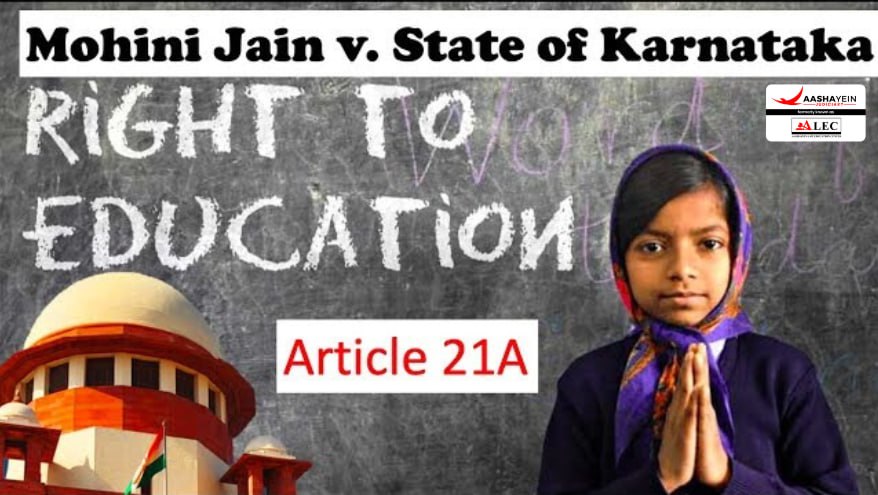Today, every Indian citizen has a right to basic education, which is necessary for a decent life, due to the right to education, under Article 21 of the Indian Constitution. This clause arose from the need to expound the right to life by giving it a meaning which includes education as a means of effectively realizing the other rights. In the leading case of Mohini Jain v. State of Karnataka, where the Supreme Court of India has given much importance to this right. The Apex Court while reiterating the aspect held that education is fundamental to freedom and the progress of society.
Fact
To end the practice of collecting capitation fees for admission to educational institutions, the Karnataka Legislature passed the Karnataka Educational Institutions (Prohibition of Capitation Fee) Act, 1984. In accordance with Section 5(1) of this Act, the Legislature published a notification on June 5, 1989, outlining the maximum amount of tuition and other fees that might be charged at private medical institutions. The statement said that students with government seats paid Rs. 2,000, while Karnataka residents apart from those enrolled under government quotas—were expected to pay an annual fee limited at Rs. 25,000.
The highest yearly fee for non-Karnataka residents was Rs. 60,000. Ms. Mohini Jain, a Meerut native, was offered admission to Sri Siddhartha Medical College, Tumkur, for the 1991 session of the MBBS program in exchange for Rs. 60,000. Her father called the college since he couldn't pay the fee. The respondents refuted Ms. Jain's allegations of an extra Rs. 4.5 lakh per capitation charge. She then filed a petition under Article 32 of the Constitution, claiming that the price structure imposed unreasonable financial hurdles, infringed Articles 12, 14, 21, and 41, and breached her basic right to an education.
You can also read the Blog by visiting [Blog]
For more information, visit [Aashayein Enquiry Section]
Petitioner’s Arguments
The petitioner contends that the imposition of capitation fees by the educational institution violates their fundamental right to education under Article 21 of the Constitution. They argue that education plays a crucial role in the holistic development of an individual, and the policy of demanding capitation fees restricts access to education based on a person's financial capacity. This practice, they assert, undermines the right to education by creating economic barriers that disadvantage financially weaker individuals.
Respondent’s Arguments
The private medical college, the third respondent, defends the classification of students into “Government seats” (merit-based) and “Management quota” (non-merit-based), asserting that this distinction is valid. They justify charging higher fees from non-merit-based candidates as a necessary measure to offset the high costs associated with providing medical education. Additionally, the Karnataka Private Medical Association argues that the absence of government financial assistance places a significant financial burden on private medical colleges, making profitability essential for their survival. They maintain that the tuition fees charged are reasonable and not excessive under the circumstances.
Issues
- Whether the Indian Constitution recognizes the right to education as a fundamental right under its provisions.
- Whether the imposition of capitation fees by educational institutions aligns with the principles of equality enshrined in Article 14 of the Constitution.
Judgement
The Supreme Court of India held that the practice of collecting capitation fees by private educational institutions is unlawful, reaffirming the fundamental right to education under Article 21 of the Indian Constitution. The Court emphasized that Article 21 not only protects the right to life and personal liberty but also encompasses the right to education as an essential component of holistic development.
Additionally, the Court ruled that the imposition of capitation fees violates Article 14 of the Constitution, which guarantees the right to equality. It observed that such fees have no direct correlation to the quality of education offered by these institutions and are primarily driven by profit motives. This practice, the Court noted, results in economic discrimination by excluding individuals from economically weaker sections of society, who cannot afford the exorbitant fees. The Court directed the government to take necessary measures to prohibit capitation fees by regulating the fee structure of for-profit educational institutions. It stressed that education must remain a fundamental right accessible to all, and not be reserved exclusively for the affluent. The judgment underscores the principle that education is a public good and should be equitably available to every citizen, regardless of their economic status.

